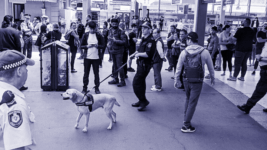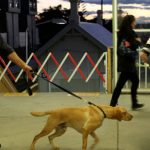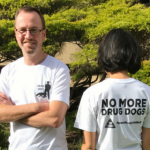NSW Police Use of Drug Dogs and Strip Searches Slammed as Ineffective and Unlawful

Of the 82,471 strip searches NSW police performed over the ten years to 2023, only 11,136, or 13.5 percent turned up an illicit substance. Further, 6,716 of these searches followed a drug dog indication, yet only 2,713 of them, or 40 percent, turned up any drugs, and most were a personal amount of an illegal substance.
Released on Monday, 28 July 2025 the Use of Strip Searches and Drug Dogs in NSW report makes a number of recommendations, including key long-term call to reform the practice of NSW police officers making civilians, often vulnerable young people, strip off on suspicion of minor drug possession and that law enforcement stops the deadly practice of using drug detection dogs at music festivals.
Produced by Redfern Legal Centre and Harm Reduction Australia, the report is based on the NSW police data covering the years 2014 through to 2023, which was obtained, via questions on notice to the minister provided by NSW Greens MLC Cate Faehrmann, who has long been pushing for these harm reduction reforms in NSW parliament.
The report notes that the NSW Ombudsman reported on the futility of the NSW police drug detection dog unit in 2006, as searches were finding no drugs on three-quarters of occasions, and it also highlighted that a drug dog indication likely doesn’t provide an adequate legal basis for a search, while the rise in accompanying strip searches over recent years has been at the whim of the force.
But despite all the obvious long-term failures of the strategy, NSW police must continue “to use this ineffective, inequitable, risky and statistically inaccurate strategy”, which exacerbates health and social harms, because it is serving some of its operational needs, as it certainly does nothing to achieve “Australia’s national drug strategy objective of harm minimisation”.
Akin to sexual assault
“The significant harm caused by strip searches is not justified,” said report coauthor Redfern Legal Centre police accountability senior solicitor Samantha Lee, hinting at the fact that civilians often find stripping off in front of armed and uniformed strangers traumatising. “Most searches yield nothing, and when something is found, it is often only a small quantity of drugs for personal use.”
“Not only does the end not justify the means, but the process also inflicts ongoing trauma on many young people and children,” the lawyer continued. “This violating practice needs to stop. It is a recommendation within the NSW Drug Summit report, yet still this practice continues.”
Redfern Legal Centre was behind the long anticipated strip search class action, which it led in the NSW Supreme Court, alongside Slater and Gordon, in May this year. The outcome of the action that involved 3,000 plaintiffs, who had been strip searched by the NSW police at music festivals between 2016 through to 2022, is still pending.
The class action was sparked by the onslaught of stories circulating about NSW police officers gone wild at music festivals, as they liberally strip searched teenagers on the flawed basis of a drug dog indication and a fruitless pat down search, and the Law Enforcement Conduct Commission launched an investigation into the matter, which found example after example of illegally applied strip search.
“Not only is there little to no evidence to support the continuation of the strip-searching program, but there is also now a growing body of evidence clearly demonstrating the horrendous level of pain and suffering it inflicts on some of our most vulnerable young people,” outlined Harm Reduction Australia president Gino Vumbaca, who also coauthored the report.
Sniff off
Then NSW Ombudsman Bruce Barbour outlined in 2006 that the use of drug dogs was ineffective in terms of detecting drug dealers. This assessment of the NSW police sniffer dogs following their 2002-introduction found that most people the canines did indicate, or 74 percent of them, had no illegal drugs in their possession, while those who did usually had a small amount of cannabis on them.
Lee and Vumbaca point out that vulnerable people are often targeted by police in their use of drug dogs and strip searches, with significantly higher strip search rates when it comes to First Nations peoples. Strip search operations are often carried out nearby First Nations communities, while they’ve also been shown to disproportionately target areas of lower socioeconomic circumstances.
The strip search report further notes that NSW police sniffer dog standard operating procedures clearly state that an indication by a drug detection dog does not provide ‘reasonable grounds’ to conduct a search, and in fact, officers ought to be undertaking further investigative measures, such as questioning, in order to garner reasonable grounds of suspicion to conduct a search.
In their 2019 NSW strip search report, UNSW academics Dr Vicki Sentas and Dr Michael Grewcock explained that a twentyfold increase in the use of strip searches by NSW police over the 12 years to 2018 was not the result of parliamentary debate and legislative changes, but it was simply a shift in the practice of the NSW Police Force, despite the invasive and traumatising nature of the procedure.
Indeed, according to Sentas and Grewcock, most strip searches are being carried out in relation to suspected minor drug possession after a drug dog indication, and, as legitimate debate continues in the community as to whether such minor drug offences should even be considered a crime, making people strip off behind a screen during peak hour at Sydney’s Central Station might be a step too far.
“The premier and police minister need to put a stop to this failed program immediately and reinvest the significant resources of this program into services that help the community,” added Vumbaca in his statement on Monday 28 July 2025, which begs the question as to why NSW police might want to maintain the power to randomly subject the public to drug dogs and accompanying searches.
“Intimidation and control”
“This data confirms what we’ve known for years. NSW police are routinely subjecting people to traumatising, invasive strip searches based on the unreliable noses of drug dogs, and in the vast majority of cases, they find nothing,” said Greens MLC Faehrmann on Monday.
“Most strip searches are being conducted out of suspicion of minor drug possession, she added, so, “you have to ask why such a huge amount of police and court resources is still being spent despite the government putting in place a drug diversion scheme”.
The report notes that the Minns government introduced the Early Drug Detection Initiative (EDDI) in February 2024, which is supposed to provide officers with the discretion to issue those found in possession of a personal amount of drugs with a fine, which they can avoid paying if they attend a short drug counselling session over the phone. This can happen twice before a required third arrest.
The Liberal-devised initiative has been implemented by both majors in order to avoid rising calls for drug decriminalisation, which has been Canberra’s policy since 28 October 2023. But the EDDI is a huge failure, as figures show that from February to August 2024, NSW police chose to charge 6,332 individuals with drug possession and only divert 436, or 6 percent, of eligible people to the EDDI.
Of the 56 recommendations made by the 2024 NSW Drug Summit report the final one consists of ceasing “the use of drug detection dogs and strip searching for suspected drug possession, during the current trial of drug-checking services at music festivals, with consideration to extending this to all music festivals”.
So, the ball is really over on NSW premier Chris Minns, health minister Ryan Park and police minister Yasmin Catley’s side of the court right now.
“The Minns government continues to defend the use of these tactics, including on the false premise that it’s about stopping supply. Yet just 1.4 percent of the 82,471 strip searches led to a conviction for drug supply,” Faehrmann put plainly. This is a regime that’s “got nothing to do with safety and everything to do with intimidation and control”.
“It’s beyond ridiculous,” the Greens harm minimisation spokesperson said in concluding. “Strip searches on the suspicion of minor drug possession and on those under 18 must end and drug dogs should be banned from festivals, venues and public spaces.”






